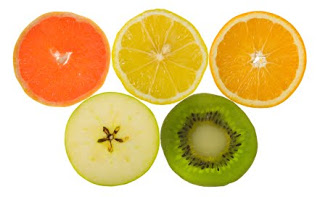With the opening ceremony of the Vancouver Olympics less than 12 hours away, I have sports on my brain. I’ll admit it, I’m a little bit of an Olympics junkie. And I don’t stick to the mainstream sports, I will watch anything and everything and even like curling and the sport where they ski and then shoot though clearly the name of this sport didn’t stick with me. As a nutritionist, it amazes me that many athletes train a good part of their lives fine-tuning their training, clothing and nutrition only to board a plane and stay in an Olympic village where Mc Donald’s and Coco Cola are strongly represented. A place where the main catering is done by Sodexho, one of the companies Michelle Obama is working with as their unhealthy offerings in schools are contributing to childhood obesity. The Olympians do have a password which allows them to view the nutritionals (amount of carbs, fat, protein, fiber, vitamins and minerals) in various food items but it still makes me nervous.
So for Lindsey and Shaun in Vancouver and all the rest of you, here are my top 5 training foods for winter sports:
1. Quinoa– chances are, you’ve been hearing a lot about quinoa lately with good reason. Quinoa is a good carb and the type of carb athletes need. The Incas considered quinoa like gold because of the stamina it provided their warriors. Quinoa and fruit makes a great breakfast or stir quinoa into soups. Quinoa cooks in 15 minutes and is high in fiber and protein.
2. Chard is a great source of iron. Iron transports oxygen through your body and helps prevent anemia. Chard is also rich in calcium for bone health and a respectable source of Vitamin C, important for winter immunity. Try to have one leafy green (kale, chard, bok choy, spinach) daily.
3. Turmeric is a wonder spice. It’s a potent anti-inflammatory and athletes should use it more. Turmeric is found in prepared yellow mustards and many Indian dishes. Turmeric also works well with cauliflower, on eggs and in dips. Lindsey, I know you have a muscle injury, turmeric may help! I recently posted a great recipe using turmeric.
4. Goji Berries are also known as wolfberries. Goji berries are a fantastic antioxidant. Antioxidants help to repair some of the wear and tear on your body from exercise. In Chinese medicine gojis are known to promote lung health, useful for winter training. Eat gojis as a snack, steep in teas and add to oatmeal water. Gogis also have an added “Valentine’s” bonus.
5. Pumpkin Seeds– seeds are often overlooked and important for your training diet. Pumpkin seeds are high in zinc, another crucial immune-system helper. Try my Training trail mix.
TRAINING TRAIL MIX: combine 1 cup goji berries, ½ cup dark chocolate chips or cacao nibs, 1 cup pumpkin seeds, 1 cup walnuts and ½ cup unsweetened shredded coconut. Mix well and store in an air-tight container. Serving= a small handful or ¼ cup.
What are your favorite winter training foods? Any pre or post-workout staples you want to share?



I think one more thing should be added to your list – tart cherries! They contain extremely high levels of potassium and melatonin – a hormone that promotes better sleep patterns. According to a study from the University of Michigan, cherries' 17 unique antioxidant compounds appear to work synergistically to deliver a more powerful antioxidant punch. These researchers found that the specific compounds worked together to boost antioxidant power more than would be expected for any antioxidant compound on its own. Lastly, one of cherries’ antioxidants, anthocyanins, have been found to block the production of inflammatory enzymes. Tart cherries are packed with important nutrients for an athlete!
My favorite way to consume tart cherries is Cherry Rosso, an incredible sports drink. They are 100% natural, and they taste great too! You can purchase them at cherryrosso.com